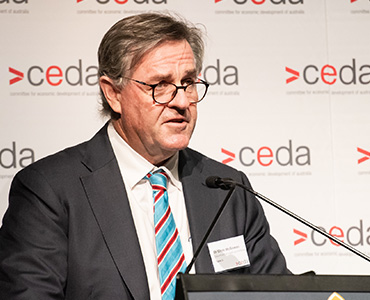Hospitals are dangerous places to be, they’re unfamiliar, you’re on drug regimes in unfamiliar places and unless you’ve got a nurse looking after you full time, you’re at risk of falling, SA Department for Health and Wellbeing CEO, Dr Chris McGowan told a CEDA audience in Adelaide.
 “It’s something like 15 per cent of all admissions have adverse events related to them and either cause readmissions or delayed length of stays,” he said.
“It’s something like 15 per cent of all admissions have adverse events related to them and either cause readmissions or delayed length of stays,” he said.
“There’s been quite a lot of work done around delivering a range of acute care, so hospital level care, coded like a hospital activity is coded, supervised under a consultant doctor but provided in people’s homes.
“We’ve just run three pilots in this regard, and they’ve had quite a lot of success.
“But what we haven’t done and what hasn’t been done anywhere in Australia is scale that so it becomes part of the health system architecture.”
Dr McGowan said there is very little service between the pharmacy, general practice and hospital.
“If you’re too sick for a GP to look after you in a 10-minute business model in SA, Australia and a lot of western countries, you end up in $2000 a day hospital system,” he said.
“People don’t like it, it’s boring, it’s very expensive and it’s risky and we can now start delivering increasing amounts of that care in the home.
“At the very least, getting people out sooner.
“We’re doing some work on 13 of the very common diagnostic related groups for hospitals, that in the New Year we expect to be able to deliver at scale in people’s homes.
“And that will not only provide safer care but at a much lower cost and much more convenience and saving our hospitals for people that really need them.”
Flinders University College of Education, Psychology and Social Work Vice President and Executive Dean, Professor Mike Kyrios agreed and said Australia needs to focus on step care.
“We talk about step care in this country, but we don’t really have step care. We’ve got intensive care, we’ve got low-intensive care and then discharge plans. They’re not always followed through and they’re not very good actually,” he said.
“I think that having a more integrated care system is the way to go.
“And in the mental health space its particularly important because you’ve got the ongoing risks of suicide if someone’s already had a suicide attempt.
“And it’s not just government services that can participate in that, NGOs can participate in that and private practitioners.”
Pharmaceutical Society of Australia (PSA) Brand Director SA/NT, Helen Stone said transition of care is a huge risk to people’s health.
“Medication changes in hospitals can be hard to understand when you’re unwell,” she said.
“And we’ve always thought that anyone discharged from hospital wherever they go, should be reviewed by a pharmacist to help them understand their medications and make sure they have access to their medications, so they know what they’re doing.
“We’ve been advocating for that to be funded for a long time and we’ll continue to.”
Ms Stone said a medicine safety report by the PSA found there were nearly 250,000 potentially avoidable medical or hospital admissions costing the system $1.4 billion per year.
“We found medication related problems in aged care, in transitions of care in the community.
“The next step is what can we do differently as a profession and how do we solve some of those problems.”
Ms Stone said the PSA is collaborating with primary health networks and universities on projects that embed pharmacists into Aboriginal health organisations, palliative care systems, general practices and aged care.
“These are non-supplying pharmacists. It’s working with GPs, working with patients and families and the practice staff…helping people to understand and take their medicines better,” she said.
St Andrews Hospital Chief Executive Officer, Stephen Walker spoke about the role technology is playing in the health system.
“I think the game-changer for health in technology is in IT, the huge amounts of data that we can collect, store and interpret,” he said.
“Just to illustrate the storage capacity in IT, they’re now working in petabytes, a petabyte is a million gigabytes. I often illustrate by saying if you had one petabyte of music on your phone, you would be able to listen to music continuously for 2000 years.
“It just goes to show what we can do with a significant amount of data.”
Mr Walker said Australia has one of the best healthcare systems in the world.
“My humble opinion is one of the reasons we do have one of the best healthcare systems is because we have the balance between the provision of private healthcare and public healthcare pretty close to being right.
“At the moment I think we’re 44 per cent private health insurance, I think that needs to go up a bit more, I think government intervention there would be good, but I think that’s one of the main reasons we’ve got a good healthcare system.”